I thought I’d document what a day is like for me here on the farm and share it with you. I should put it right out there that I’ve been taking these photos and videos over the past couple of days, so they do not represent an actual 24 hour period, but everything you see depicts a typical day for me. I’ve shrunk the photos down from the usual size, because there are so many. But you can click on any of the photos and they will “enbiggen,” to borrow a phrase from The Simpsons.
Most mornings start with my waking up between 7:00 and 7:45 a.m. – what can I say, I’m not that early of a riser, and when I haven’t gotten to sleep until midnight or later on most nights, well, I’m generally pretty groggy, even if it is late by farming standards! My first tasks involve helping George to get out the door for work by 8:00 a.m.: packing his lunch, and gathering anything else he needs to take with him. This morning, we even fit a haircut in. I’m dressed in work clothes and ready to get out the door at the same time as him – as he’s going down the driveway, I’m walking toward the coop and barn. Sometimes Loki comes with me, but there are mornings when he feels it’s much too early, and opts to get up after I return from my morning chores.

As I approach, the coop is usually rustling with chickens who are ready to come outside. Some mornings, George has already opened them up, if he woke up rather early. In either case, this is how their mass exodus from the coop looks:
Once the coop is opened, I check on the levels of all the waterers: three outdoors, two inside – the gargantuan one for the main coop, and the smaller one for the nursery pen. I also check the food level in the nursery. As we feed in the main coop at night, I don’t need to worry about their food at this time – it encourages the chickens to get outside and forage. But the littles in the nursery have food at all times.
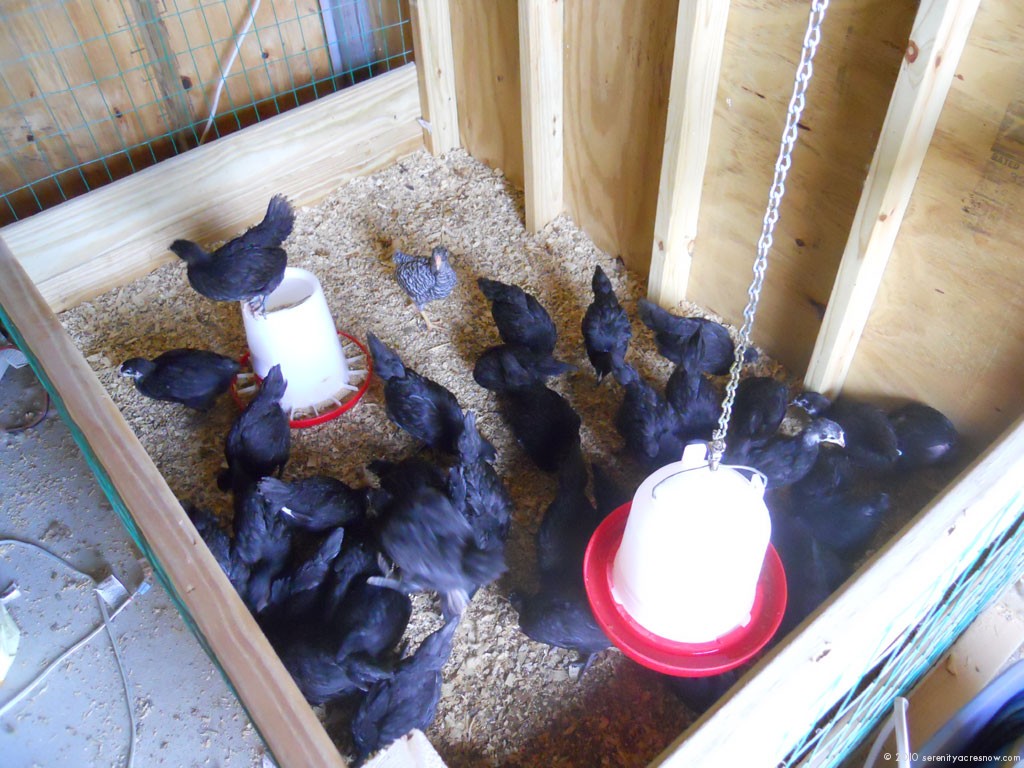
Next up is getting the barn opened up for the goats. We lock the barn up at night, including their door to get out into their fenced yard. Some farms provide free outdoor access to their goats through the night, but they also usually have some kind of guard animal – llamas or livestock guardian dogs, such as Great Pyrenees. Once we are able to get the large fenced pasture built for the goats, we will be looking at getting a llama for protection (and amusement, let’s face it, they are interesting animals!). But until then, the girls get locked up at night. So in the morning, they are ready to go!
“What’s with the blue light, Trase?”
“It’s their nightlight.”
Yes. Our goats have a nightlight. Call me goofy, go ahead. I’ve heard it before. It’s a compact fluorescent bulb that lights up part of their pen, in case anyone is having trouble getting around to get a drink of water, or anything else they need to do at night. It’s not overly bright, and most of the pen is not illuminated by it – just the stall area. So they can sleep without being disturbed by it.
My chores in the barn every morning include refilling their hay feeder, refilling their water buckets, turd removal (via pitchfork!) and getting their fan and stereo turned on. Yeah. They have their own stereo too. They listen to our local radio station, WHMI (Howell, Michigan radio). They stay informed about all of the area happenings and events.
But I’m not done yet. You see, we have a little morning ritual, the goats and I. They know that once I’m done with the cleaning chores, while they’ve been nibbling away at their fresh hay, it’s time for their morning treat. They each receive an animal cracker every morning, and if I were ever to forget, they’d vigilantly remind me. 🙂
Fear not. Gidget finally came running over and got her treat. It almost didn’t fit into her mouth because of the big bite of hay she was working on, but she made sure to get hers!
Once the morning animal chores are completed, I check the garden for anything that needs picking or attention. Notice how I’ve carefully avoided including photos of our jungle garden. Here’s what I will say: it ain’t purty, but it’s producin’. I’m going to need to invest in a machete soon, though. Next year: raised beds.
Next up, I return to the house and check on the little Denizli chicks, who are in a brooder out in the garage. They usually need a water change and their bedding changed. They are on newspapers for the first week or so, and we’ll switch them over to pine bedding this weekend. They are growing up fast!
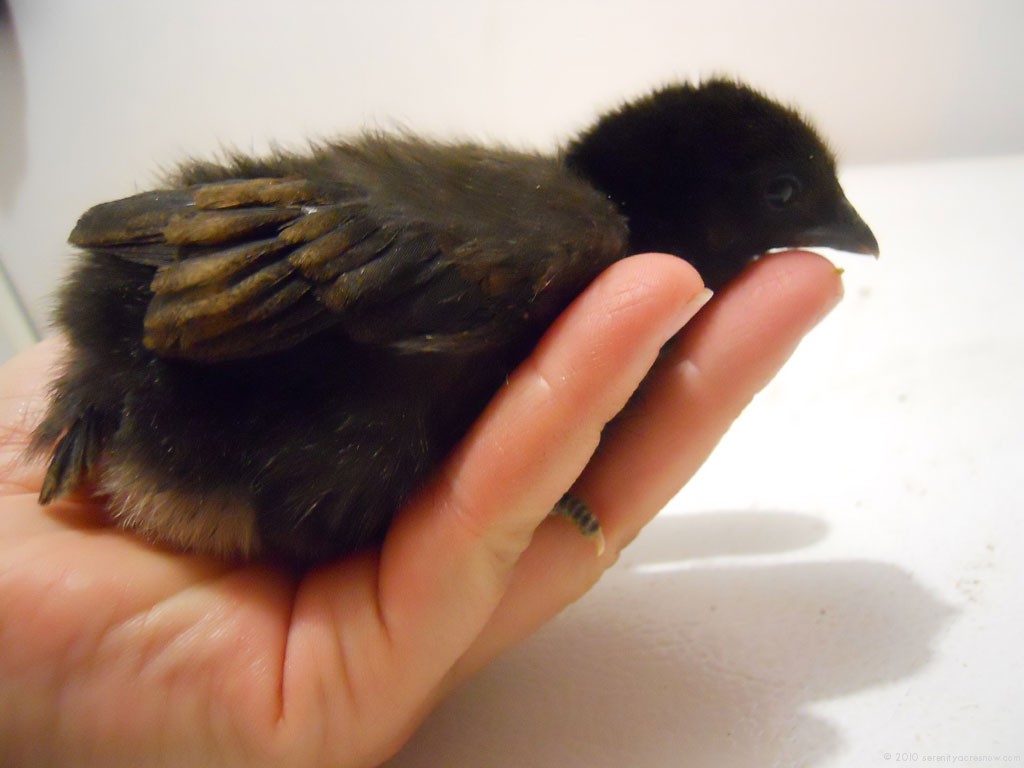
Look at how their little wing feathers are coming in! Awww. And they have tailfeathers popping now, too.
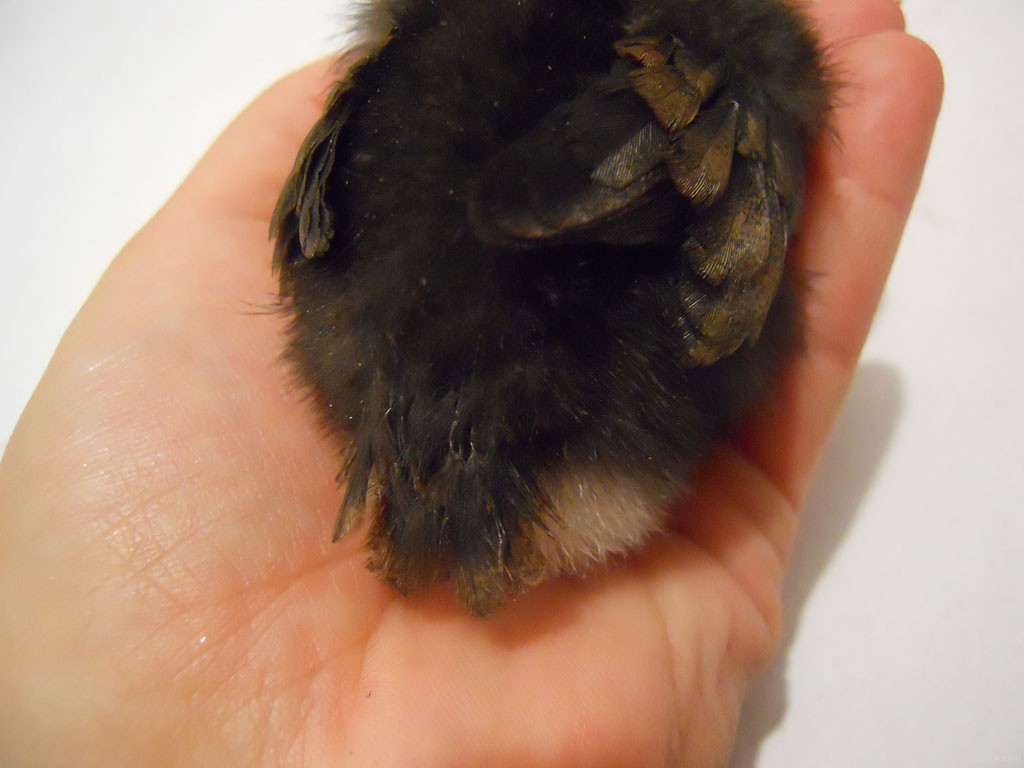
After cleaning up after the chicks and cooing at their cuteness, I wash up, then have some breakfast myself. It’s usually a bowl of cereal, but if I’ve baked anything, say, some zucchini bread (which I should be doing soon, come to think of it) I’ll have that and a glass of juice. While eating breakfast, I check my email and get caught up on what’s going on, usually checking the weather report to see what to expect for the day.
The rest of the morning is typically spent on computer-related tasks, whether it’s farm record updates, working on client websites (I provide web development services through my consulting company), or working on this very website, as I am right now! Those tasks usually take me right up to lunchtime, which for me is around 1:00 p.m. Sometimes I lunch at the computer, if I still have tasks that need attention, but what I really enjoy doing is eating my lunch while catching up on the programs I’ve recorded on our DVR, like The Fabulous Beekman Boys. After lunch, I usually take a treat out to the chickens – whether it’s leftover rice, potatoes, or other vegetables from the previous nights dinner, or some produce that’s past its prime. I don’t use any produce that is moldy or rotten. A good example would be cucumbers that have been on the vine for too long and have gone yellow. Those get sliced up and served to the chickens, much to their delight.
Perhaps a little too much. We can’t step outside without having a convocation of chickens surrounding us, anticipating some delectable delicacy.
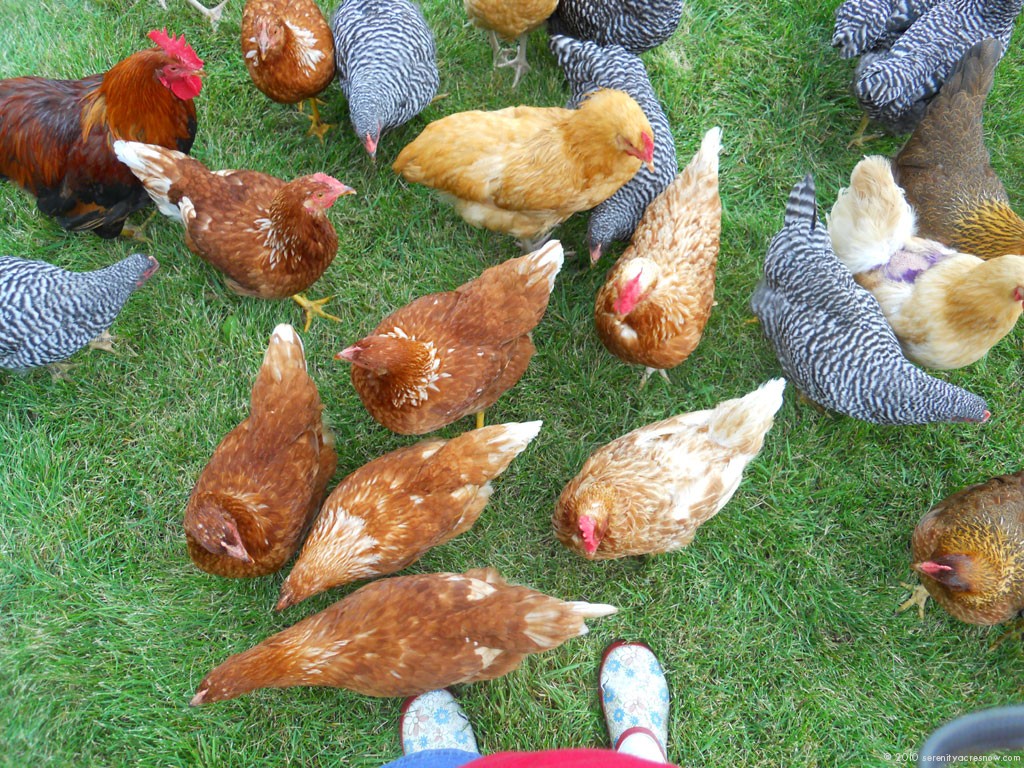
And when I’m just walking outside to do something else, sans sweets, they still remain in hot pursuit, ever hopeful:
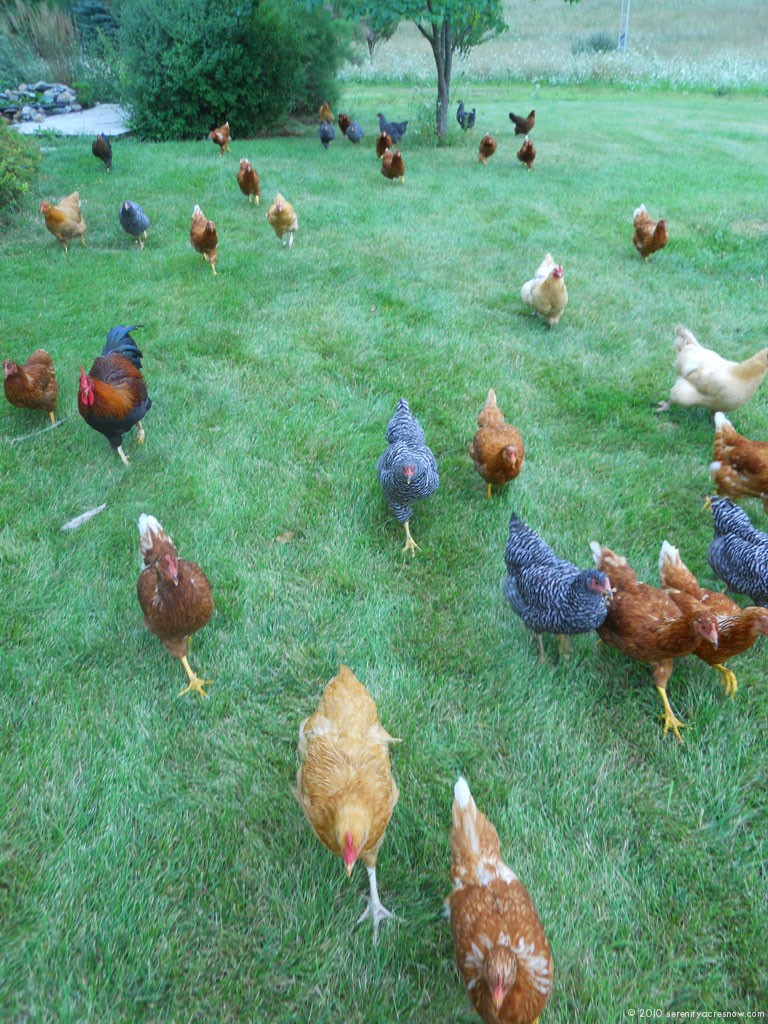
I check their waterers during the after-lunch chores, and refill any that need it. I also check on their little blue swimming pool, as it sometimes needs a dump, rinse, and refill at this point. They are still a bit leery of the thing, but are warming up to it a little more every day. I really hope they start dipping their feet into it on hot days, it would help them cool off. (Note: there is only about 1″ of water in it – do not fill one of these up and give it to your chickens. They are not bright about it, and may drown.)
This is also usually the time that I take the goats on a walk, depending on the weather. If it’s pouring rain, then, no. But most days it’s nice enough for a walk, and so it gives them a chance to stretch their legs, run, do some capricious leaping, and most importantly, get some foraging in. Goats do not graze like sheep do – they browse. Meaning, they like to eat things that are level with their heads, or above. So they aren’t going to mow your lawn.
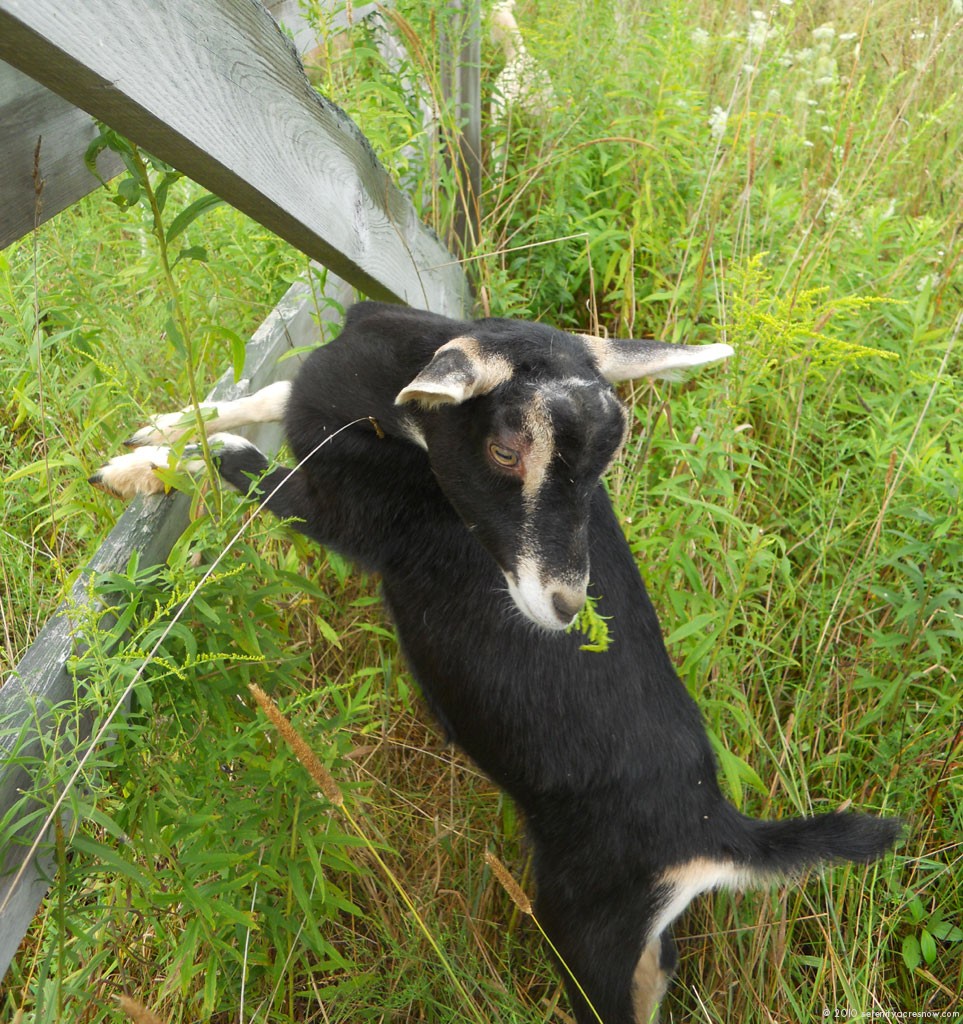
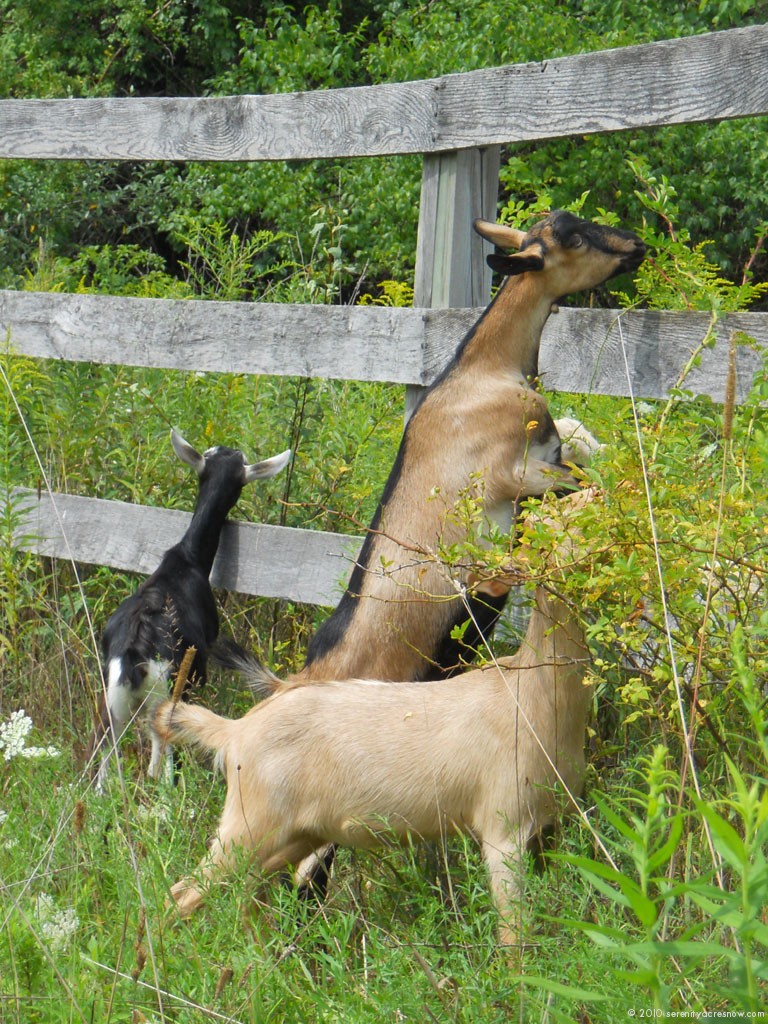
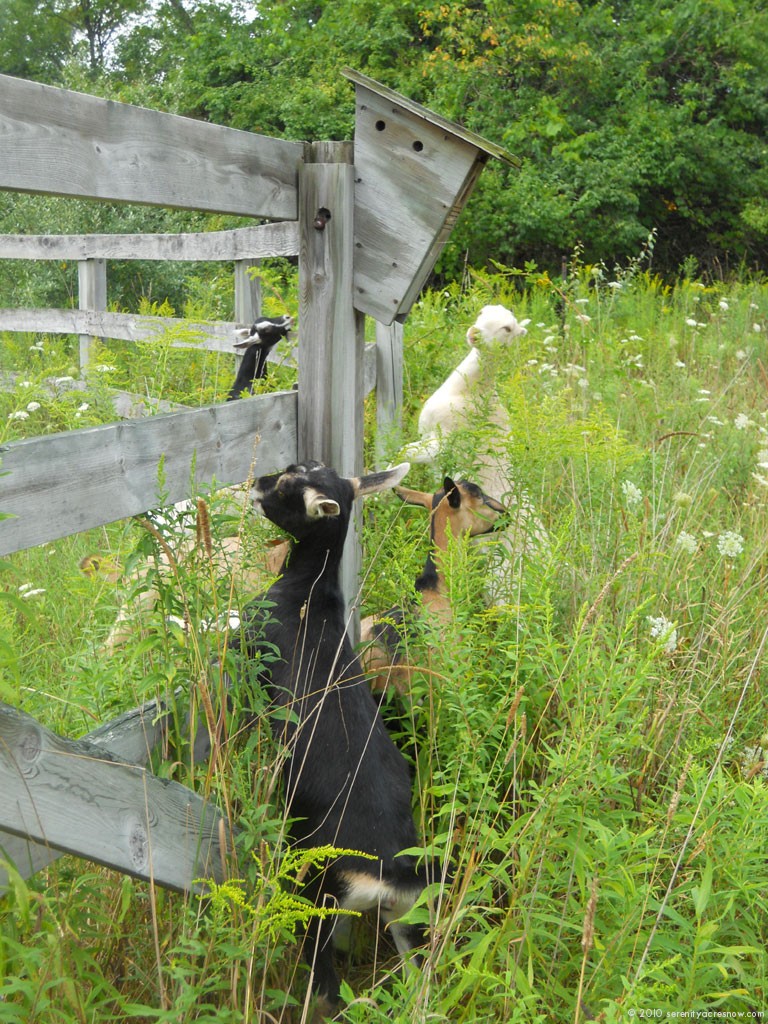
After the goats have been lured back into their pen in the barn (usually with another round of animal crackers), I head back to the house to continue with some indoor chores. Depending on the day, this can mean laundry, cleaning, or at this time of year especially, preserving food. In fact, I have bread and butter pickles on the agenda this afternoon. Come around 5:00, it’s time for me to start dinner, as George arrives home around 6:00. We usually have more projects to work on together after dinner; it can be anything from running the electrical in the chicken coop, to lawn-mowing, to technical matters with our webserver. During the summer, we try to get in a swim every night, which also helps us to keep up on the pool maintenance.
Around 9:00 p.m., the sun has set and things are getting dark. We can go outside and start our evening animal chores. We have a red CFL bulb on a timer in the chicken coop that comes on around 8:00 p.m. to start beckoning the flock inside. Chickens don’t like going into dark buildings – they don’t know what might be lurking inside. So if you have a coop and your chickens won’t go in at night, give thought to your lighting situation.
Once we confirm that everyone is inside, we shut and lock the chicken door on the coop. The waterers inside need to be checked and refilled if needed, the nest boxes checked and eggs collected, and the feeders in the main coop refilled. We usually spend some time talking with the chickens. One of our “Picard” (Silver Duckwing Bantam) roosters likes to fly up and roost on the rafters – but once he sees the food getting doled out, he swoops down!
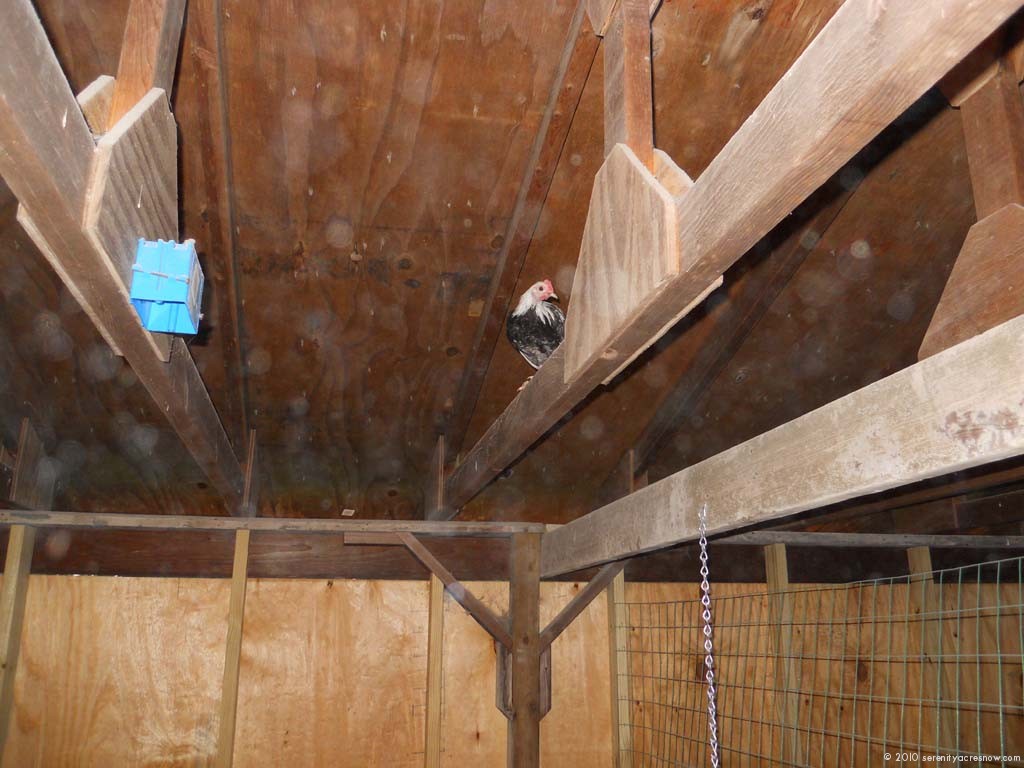
After the chickens are settled in for the night, we head for the barn, and the goats are ready and waiting for us, anxious for their night time treat. I go into the pen, closing up the door to their outside yard and locking it, and then George hands me a flake of hay for their feeder, the watering jug to refill their buckets, and finally – the thing the goats crave most – a bucket of molasses grain. I have to race them to the feeder trough to get the grain dumped in before they stick their heads into it. It’s a little game we play every night. We’re going to have to change things up in the next few months, because as adults, they won’t get their grain in this manner – they will receive a bucket of it in the morning and at night while on on the milking stand. But for now, we are indulging our babies, and they do appreciate it:
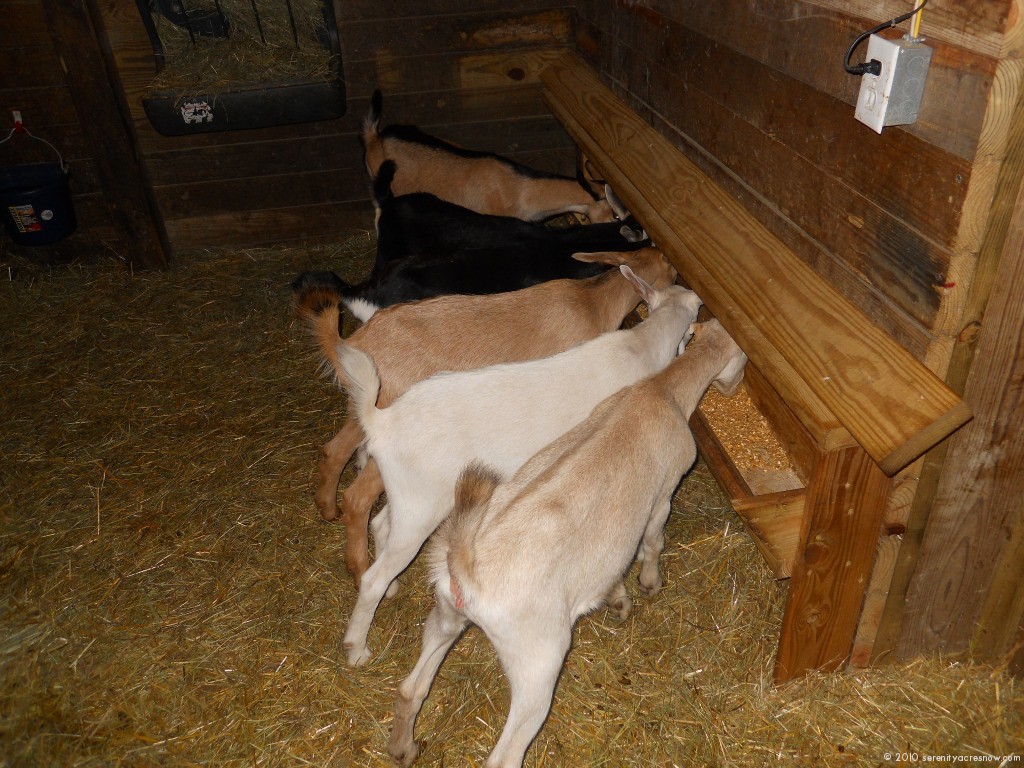
And then, it’s lights out.
Well, except for, you know…
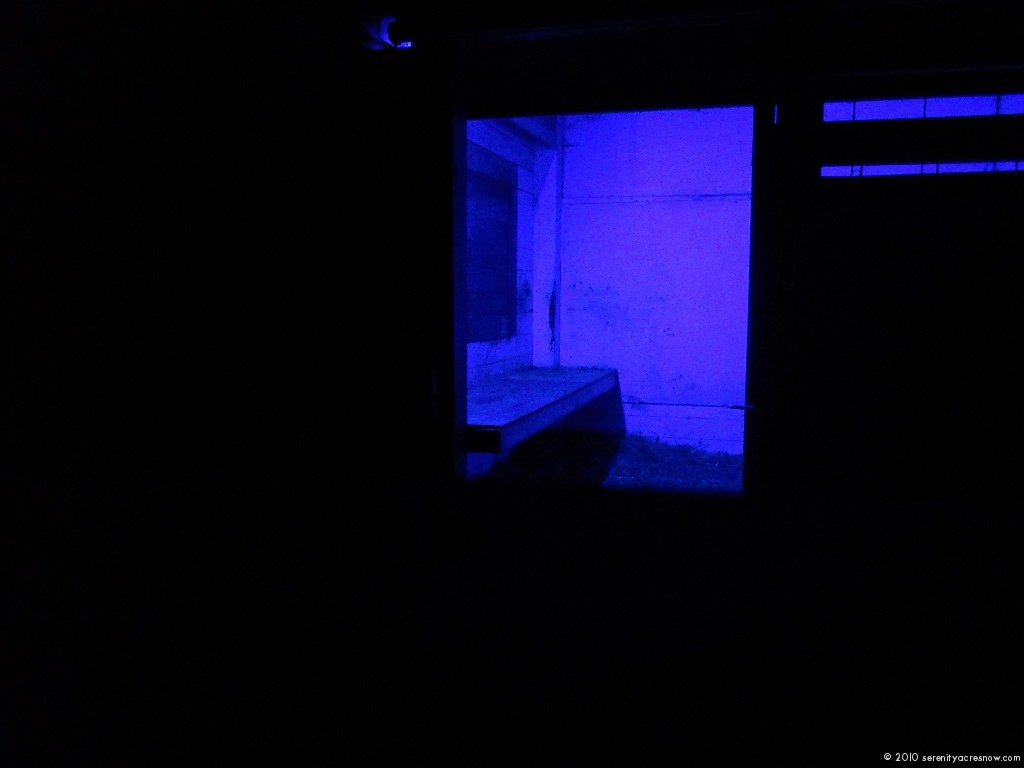
We usually get back into the house by about 9:30-10:00 p.m. ourselves, and honestly, about all we have the energy for at that point is doing impressions of starchy root vegetables lounging on living room furniture. We’ll catch up on programs we’ve recorded on the DVR, and I’m usually asleep by midnight. Then we go to bed, and start it all over again the next day.
I’m sure I’ve missed some things that I’ll think of later, but that’s inevitable. My cousin told me earlier this year, “I think you are busier and working harder now than when you were employed!” I’d have to say, I agree, especially in terms of physical labor. But I’m happier, and the work is more satisfying. I am really hoping that all of this effort pays off for us. I think that it has in many ways already: growing our own food, getting our own eggs, and the promise of goat milk (and cheese!), come next Spring. But I need these pullets (juvenile hens) to come into laying soon so that I can sell some eggs, and help offset some of our costs. Perhaps they need their own stereo, like the goats.
I hope that you’ve enjoyed this glimpse at my daily life. If you have any questions or comments, I’d love to hear from you – you don’t even need to register to post. 🙂


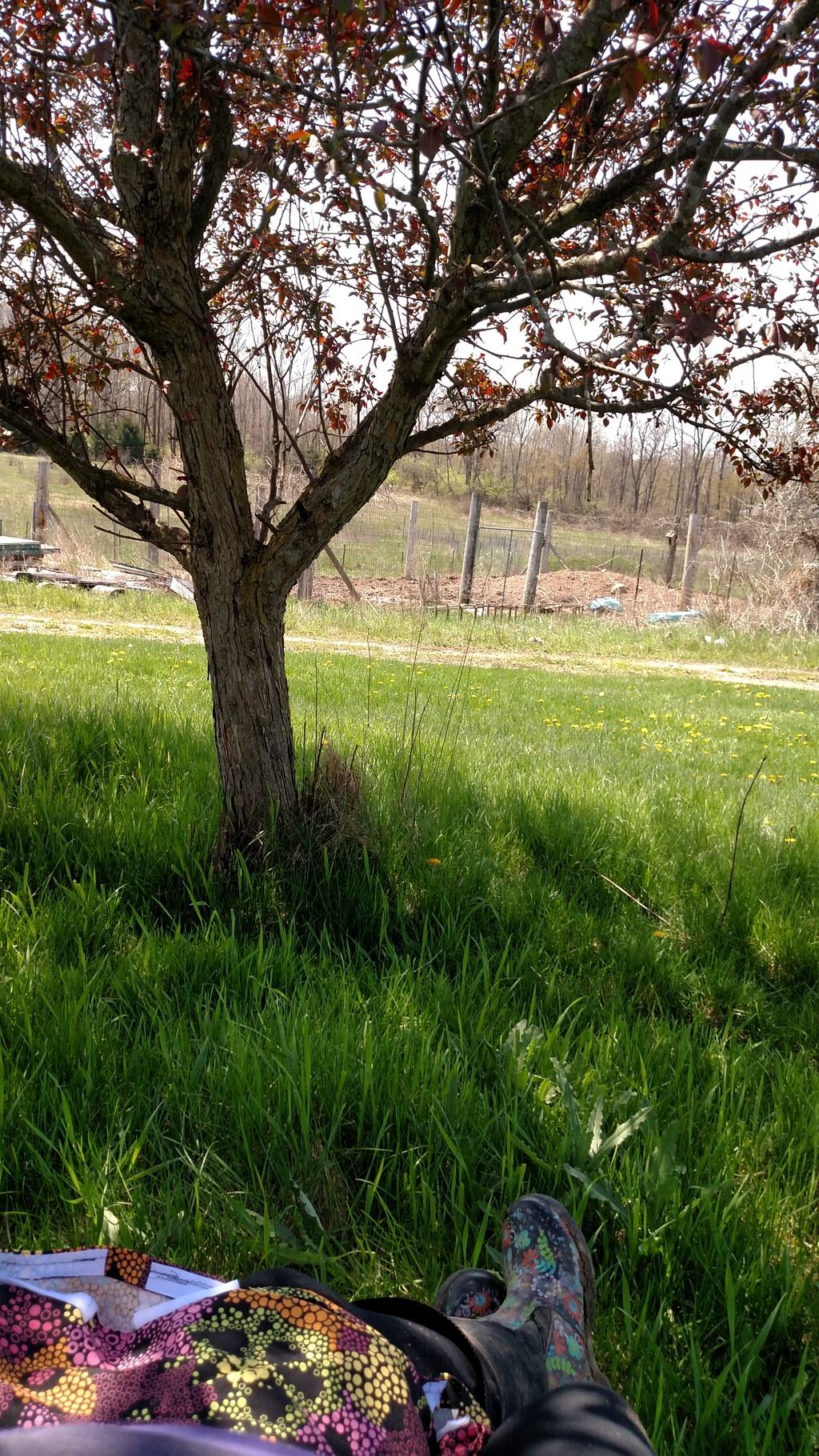
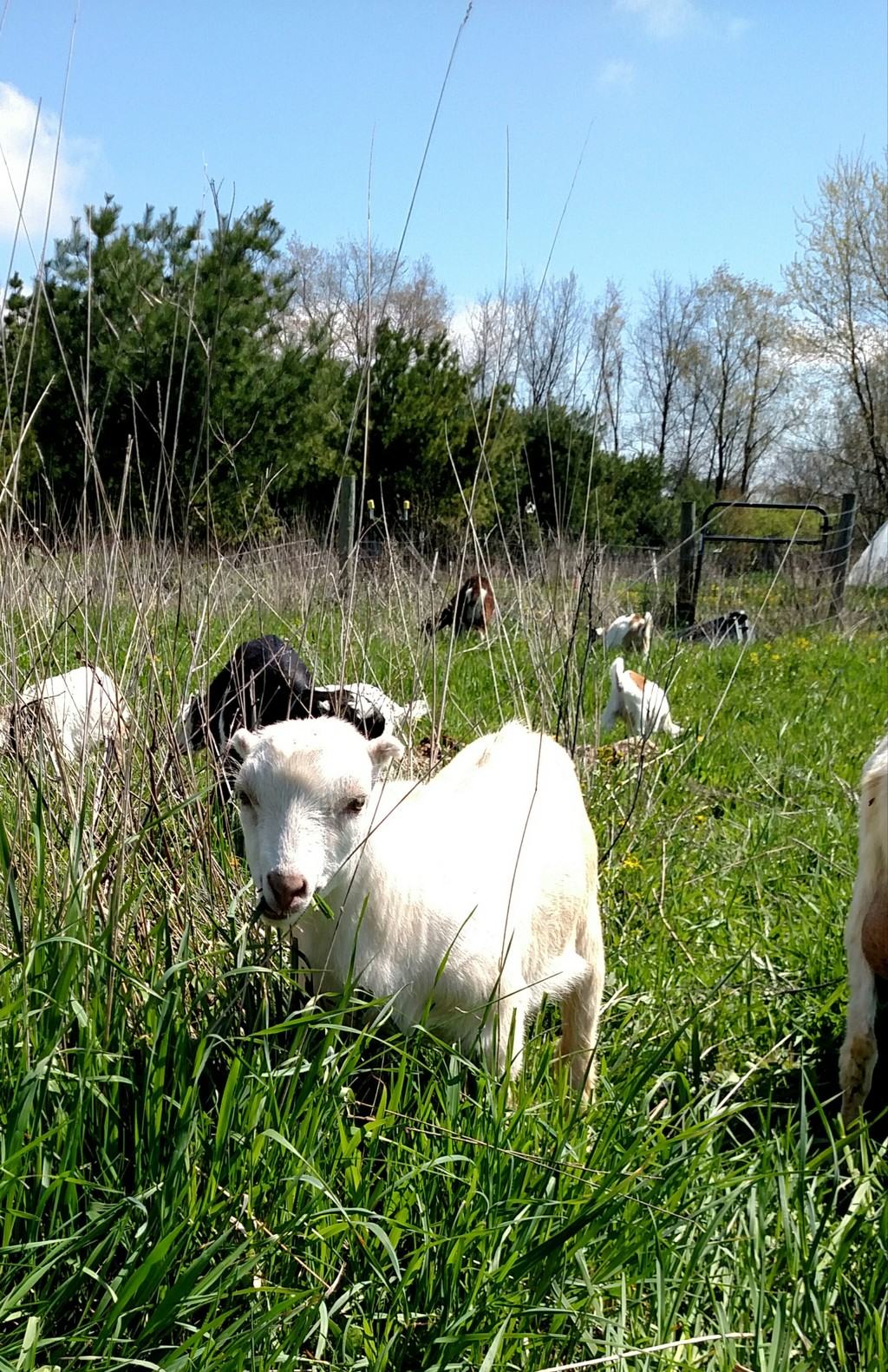
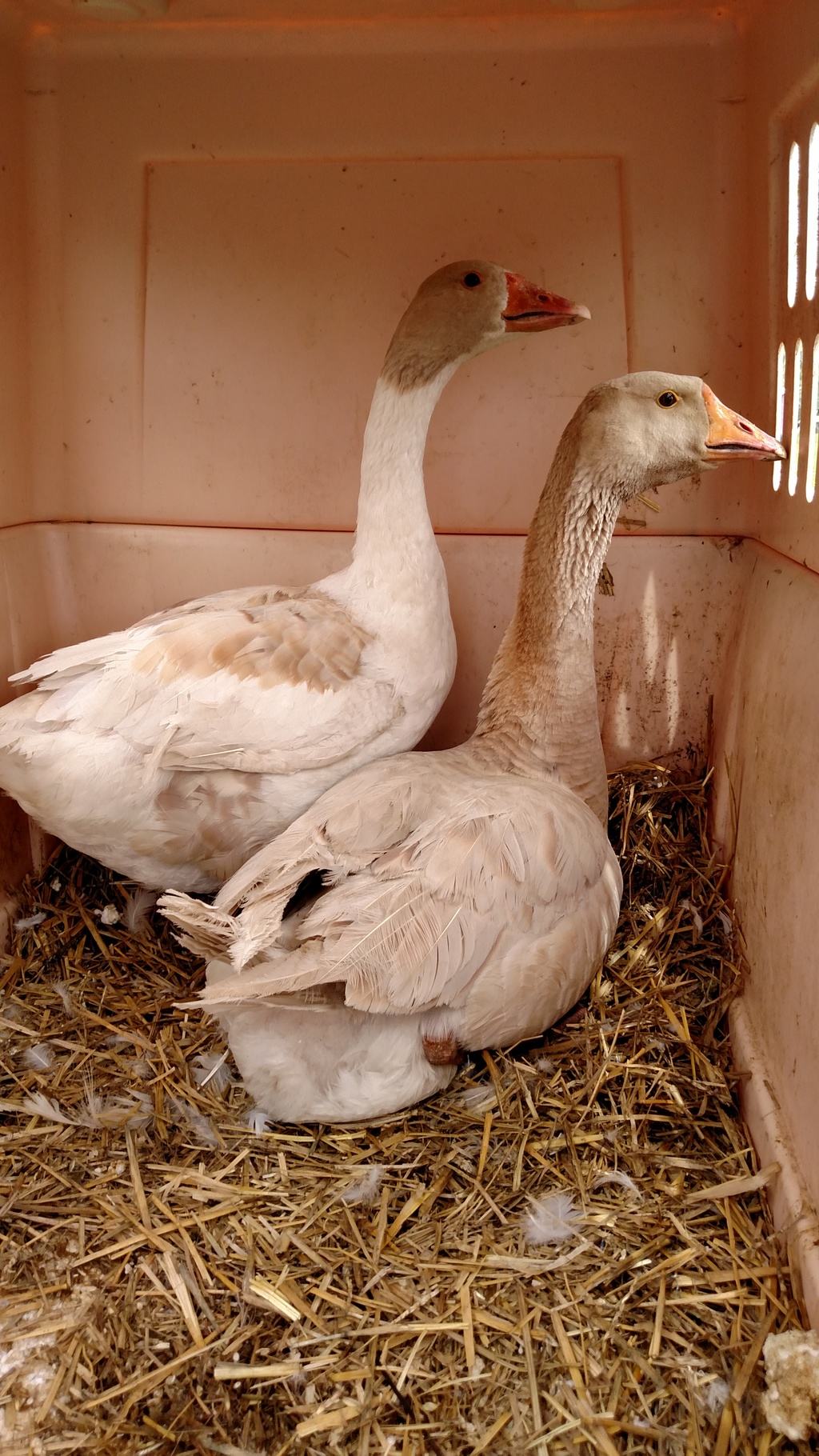
Leave a Reply